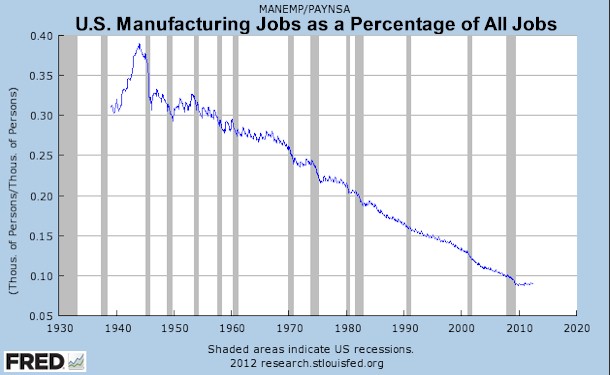Do 15% of Ohio Republicans think Romney killed bin Laden? Probably not.: "Telling conservatives that there were no WMDs in Iraq made them more likely to say there were weapons, and telling them that the Bush tax cuts reduced revenue made them more likely to say they increased revenue."
'via Blog this'
Tuesday, September 11, 2012
Monday, September 03, 2012
The Observatory of Economic Complexity ::
The Observatory of Economic Complexity :::
Trade data visualization is really amazing. However, the rankings of trade complexity of countries jumps from one year to another. For instance, Ukraine jumps from 32 to 25 before it sinks.
'via Blog this'
Wednesday, August 22, 2012
Martin Ford: How Will China Employ Its Factory Workers After the Robots Come Online?
Martin Ford: How Will China Employ Its Factory Workers After the Robots Come Online?:
'via Blog this'
The real problem China faces is that it is late to the party. Just as it reaches its manufacturing employment zenith, it faces a potentially disruptive impact from automation technology. And that will happen roughly in parallel with similar transitions in the service sectors of the countries that currently consume much of its output.
'via Blog this'
Russia joined WTO today
On August 22, 2012 Russia Russia Russia
This development is an opportunity for Russia
Thursday, August 16, 2012
Most massive and luminous galaxy cluster identified - MIT News Office
Most massive and luminous galaxy cluster identified - MIT News Office:
'via Blog this'
 |
| Illustration courtesy M. Weiss, CXC/NASA |
'via Blog this'
Monday, August 13, 2012
International Trade and Institutional Change: Medieval Venice's Response to Globalization
International Trade and Institutional Change: Medieval Venice's Response to Globalization:
'via Blog this'
Diego Puga, Daniel Trefler
International trade can have profound effects on domestic institutions. We examine this proposition in the context of medieval Venice circa 800-1350. We show that (initially exogenous) increases in long-distance trade enriched a large group of merchants and these merchants used their new-found muscle to push for constraints on the executive i.e., for the end of a de facto hereditary Doge in 1032 and for the establishment of a parliament or Great Council in 1172. The merchants also pushed for remarkably modern innovations in contracting institutions (such as the colleganza) that facilitated large-scale mobilization of capital for risky long-distance trade. Over time, a group of extraordinarily rich merchants emerged and in the almost four decades following 1297 they used their resources to block political and economic competition. In particular, they made parliamentary participation hereditary and erected barriers to participation in the most lucrative aspects of long-distance trade. We document this 'oligarchization' using a unique database on the names of 8,103 parliamentarians and their families' use of the colleganza. In short, long-distance trade first encouraged and then discouraged institutional dynamism and these changes operated via the impacts of trade on the distribution of wealth and power.
'via Blog this'
Friday, May 11, 2012
Friday, June 10, 2011
Interview with Ricardo Caballero - The Region - Publications & Papers | The Federal Reserve Bank of Minneapolis
Interview with Ricardo Caballero - The Region - Publications & Papers | The Federal Reserve Bank of Minneapolis
Caballero talks about current state of macro and possible steps to move forward.
Subscribe to:
Posts (Atom)
